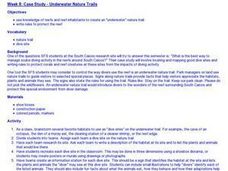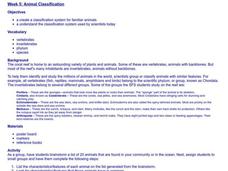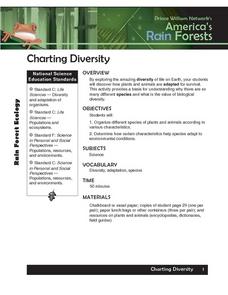Curated OER
Heading South
Students look at the migration of different birds. In this migration lesson, students discuss why an animal migrates and problems that can occur during migration. They look at several downloadable maps that show the specific routes of...
Curated OER
Underwater Nature Trails
Students research dive sites on an underwater nature trail that would introduce divers to the wonders of the reef surrounding South Caicos. They then recreate each dive site using shoe box diorama and create an information station at...
Curated OER
All That Glitters...
Learners study that white light (visible light) is comprised of all colors of the spectrum. They study that the quantity of light decreases with increasing depth in the ocean. They study that the quality of light changes with increasing...
Curated OER
Ocean Animals Word Scramble
For this worksheet on ocean animals students will examine eight pictures and scrambled names of different ocean animals, then write the unscrambled name on a blank line.
Curated OER
Ocean Worksheet - Practice Counting
In this counting worksheet, students will determine the number of starfish pictured by counting and then identify the correct number form a list of four numbers.
Curated OER
Earth Book
After viewing a teacher-led demonstration on a variety of landforms of the Earth, 1st graders create an Earth book. This nicely-done hands-on lesson has students produce books that describe, in pictures and words, different aspects of...
Curated OER
Light Up the Deep Sea
Students simulate bioluminescence in the marine environment. In this marine science instructional activity, students investigate how animals in the deep ocean communicate with each other. They explain the function of bioluminescence...
Curated OER
How Can We Help?
Students explore ocean animals and their environments. In this environmental stewardship lesson, students read a story and discuss the environmental needs of animals. Students think of ways to help clean up the environment and to make...
Curated OER
Corals and Coral Reefs
Students label the continents, oceans, and seas on a provided world map and use it to determine where they would expect most of the world's coral reefs to be found based on provided information the teacher has read to them.
Curated OER
Ocean Life
Students explore the types of plants and animals that can be found in the ocean. They browse books and/or magazines to identify and gain a knowledge base of plant and animal life found in the ocean, then create a collage.
Curated OER
Ocean Life Zones Notes
For this ocean zones worksheet, students label the ocean diagram with the different zones. Then students write in animals that live in each of the zones and research basic information about those animals. This worksheet has 6 fill in the...
Curated OER
Animal Classification
Students list characteristics and features of animals found in their community. They then group the animals according to how they are similar and different and create names for each group. They then create a chart of their...
Utah LessonPlans
Water, Please!
Students use a globe and cups of water to illustrated the amount of water versus land on earth and the amount of fresh versus salt water available to plants and animals.
Curated OER
Who Lives in a Wetland?
In this science worksheet, students list the names of 14 animals that live in a wetland. The animals are pictured and numbered. Students identify the animals and color the picture.
Curated OER
Life in the Kelp Forest
Students research and create a marine food web to learn about plants and animals in a kelp forest. For this marine food web lesson, students draw lines between kelp forest predators and prey and show the flow of energy in the food web....
Curated OER
Charting Diversity
Students organize different species of plans and animals according to various characteristics. Students then determine what characteristics enable them to survive in their habitat. Game ideas and activities are included.
Curated OER
Sponges, Cnidarians, Flatworms, and Roundworms
In this simple animals instructional activity, high schoolers compare and contrast the body plans of sponges, cnidarians, flatworms, and roundworms. This instructional activity has 4 short answer questions.
Curated OER
Octopus Legs
Students have oceans of fun transforming a wienie into an octopus they can eat! After counting, cutting halves and fourths, observing steam and the effects of heat, they mix colors as they create a yummy dipping sauce from mustard and...
Curated OER
Oil Spill Dangers
Middle schoolers analyze the effects of oil spills on our environment and develop action plans to protect animals and habitats.
Curated OER
Conservation and Environmental Protection
Students brainstorm a list of environments and animals from around the world that need protection. They then design and create a slogan about an animal or environment and an environmental protection poster.
Curated OER
Oh No! Oil Spills
Students discover the threats of an oil spill. In this ecological awareness instructional activity, students examine the effects of oil spills on animals and our oceans. Students get simulated oil on themselves and discover ways to...
Curated OER
The Intertidal Zone
Young scholars research the diverse animal and plant life that inhabit the intertidal zones along the Pacific rocky coast. As students progress through this lesson, they begin to recognize distinct behaviors, adaptations, and...
Curated OER
Salinity
Students take a provided ocean Trivia Quiz in order to start a discussion of the ocean. They then perform an experiment on how the amount of salt in the ocean affects it and varies from ocean to ocean.
Curated OER
Under the Sea Webquest
Fourth graders work in small groups to research a selected species of ocean creature. They conduct Internet research, complete a WebQuest and worksheet, and complete a group oral presentation that includes an illustration of the food...

























